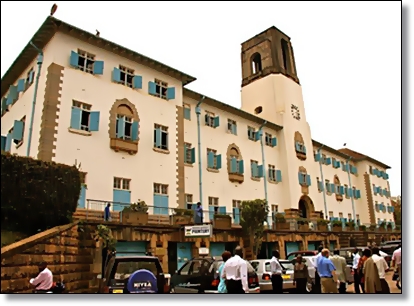Africa: Higher Learning Curriculums Need Overhauling

 |
| Makerere University Photo courtesy |
Ochen’s situation is a dilemma that thousands of African graduates are faced with. Many education experts are of the view that today’s university curriculums need to be urgently overhauled, if the students are to graduate with relevant skills required in today’s ever changing job market.
According to Fagil Monday, a former headmaster, education commissioner and now a prominent Ugandan education consultant, “Uganda and African countries at large should overhaul their university education curriculums and replace them with vocational related curriculums. Theory-based curriculums cannot spur the critical mass of skilled graduates needed to transform today’s African economies. African countries should start training its students according to the needs of their economies.’’
Universities are supposed to be the centre of knowledge of production and dissemination where learners are equipped with relevant knowledge and skills that make them capable of solving societal problems. I studied from Makerere university- Uganda. I have also visited a number of African universities and established networks with alumni from different African universities. Believe me, African universities are far from this assertion. A big percentage of knowledge production and dissemination in Africa is happening outside its universities. Most of it is happening in informal sector that is dominated by school drop-outs and people with no formal education at all, who interestingly have proved to be very innovative and innovative. When you look at excellent art pieces, good herbal medicines, the nice music, and nice cultural drama, nice welded pieces, you will be mesmerized.
All the well-established universities in Africa offer agriculture, music, dance, drama, business and economics related courses. How come that graduates of these studies are not amongst the successful farmers, musicians and business owners that Africa has and is producing? A big percentage of leading musicians, actors, actresses, farmers and business owners never went through African universities. This to me, indicates that, there is a problem with African university curriculums.
Visit any African university towards an examination period and you will be surprised. You will meet students in libraries, lecture halls and some seated under tree shades, busy cramming notes preparing for the exams. The exams are also set in such a way that if you don’t cram, you will not pass. African universities are thus producing half-baked graduates who are not critical thinkers and problem solvers.
Many graduands find themselves suffering from identity career crisis, as they cannot rightly identify areas where to best apply their competencies. Try asking any job searching graduate in Africa which kind of job you can help to connect him/her to, she/he will tell you, “Any. I don’t mind.” This implies that African universities are passing out graduates who do not know what they can do best.
The way the university curriculums are developed also raises many questions. Enough research is not done prior to their formation and many of them are not developed in consultation with employers, which if done, would greatly help in teaching the students the relevant courses that are needed in the job market. African universities should establish links with employers and endeavor to always consult them when developing their curriculums.
Today’s university teaching that encourages cramming needs to be urgently overhauled. University teaching should be 100 percent research oriented. This is the only way through which inventions and innovations accompanied by ground breaking researches will be crop- up.
Libraries and research labs of universities such as University of Nairobi, Butare University, Cape Town University, Makerere University and Maseno University, among others, are poorly equipped and cannot support effective researching. They are dotted with outdated books and equipment, which are no longer needed in today’s global arena. Printers in these facilities are very expensive. The internet speed is too slow. It takes a student over fifteen minutes to download a single PDF file and over one hour to transmit a single PDF file to colleagues over email. This in essence implies that sharing of knowledge among the students is very expensive and slow. Library resources in these universities need to be replaced with the state – of – the - art resources that will make it possible for ground breaking solutions to be birthed in Africa.
Today’s African universities, in pursuit of money, are cheating the students and stakeholders in the education sector through offering duplicated courses to learners. In universities such as Makerere University, Ibadan University, Walter Sisulu University and Strathmore University, among others, there are courses such as, bachelor of business administration, bachelor of business management, bachelor of entrepreneurship and small scale business management, and bachelor of management, which are being offered as separate independent courses but in reality they are not as on completion, graduates of these courses are finding themselves competing for the same jobs. Surely, these courses must be emerged into one course. In others, courses such as, Bachelor of Arts in economics, Bachelor of Arts in development economics, bachelor of economics and management, are also being taught as separate independent courses which in reality are all the same and needs to be emerged and offered as one single course. Other faculties are also doing the same which in my opinion should be stopped.
In sum, African governments must step up funding to their universities and design practical relevant education policies that direct their universities to overhaul today’s cramming based learning and replace it with research based learning which in my opinion is the only way through inventions, innovations and ground breaking researches which are badly needed, will be birthed in Africa.
By Moses Hategeka.
The author moseswiseman2000@gmail.com is a Ugandan based independent governance researcher, public affairs analyst and writer.
